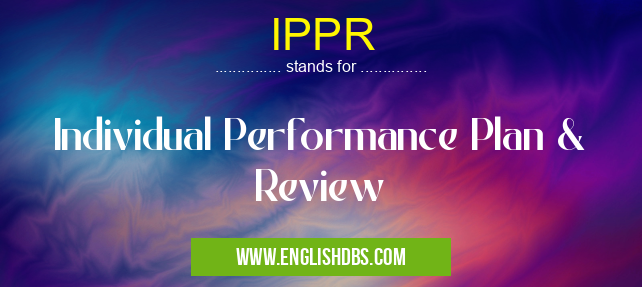What does IPPR mean in GENERAL
Individual Performance Plan & Review (IPPR) is a systematic process used by management to help them evaluate employee performance goals, objectives and outcomes. It can help employers identify areas of improvement and track progress over time. The IPPR provides a clear structure for employees and supervisors to work together on developing achievable performance objectives. The review process is designed to align employees' goals with the organization's overall mission and strategy. IPPR allows management to periodically review performance against expectations and facilitate ongoing feedback that can result in improved job satisfaction for employees

IPPR meaning in General in Business
IPPR mostly used in an acronym General in Category Business that means Individual Performance Plan & Review
Shorthand: IPPR,
Full Form: Individual Performance Plan & Review
For more information of "Individual Performance Plan & Review", see the section below.
Essential Questions and Answers on Individual Performance Plan & Review in "BUSINESS»GENERALBUS"
What is an Individual Performance Plan & Review (IPPR)?
An IPPR is a process which establishes goals and objectives with an employee, measures the performance of those goals, and provides feedback at regular intervals. It is designed to ensure that employees are setting and achieving realistic targets while aligning their personal objectives with organizational objectives.
How often should an IPPR take place?
The frequency of IPPR depends on the organization. Generally it takes place once a year, but some organizations may choose to carry out reviews more frequently such as quarterly or bi-annually.
What information can be included in an IPPR?
During an IPPR, key discussion points typically include goal setting and objectives, job satisfaction and contentment, feedback from supervisors on performance throughout the year and any areas for improvement or further development.
Who attends the IPPR meeting?
The IPPR meeting typically involves two participants — the supervisor/manager of the employee and the employee themselves. In some cases it might involve other stakeholders such as Human Resources or direct colleagues.
Who drives the agenda of an IPPR?
The supervisor/manager usually sets and drives the agenda for IPPR meetings as they have overall responsibility for managing performance within their team/department. However, employees can bring forward ideas to discuss during their review if they feel this will contribute to improving performance in any way.
Should notes be taken during an IPPR?
Yes, it's important to accurately capture all discussion points during a review so that any action points arising can be tracked easily afterwards. Notes should also be taken at other stages throughout the yearly cycle such as when goals are set or progress is reviewed halfway through a period of time.
How long does an IPPR meeting last?
Although this varies by organization, reviews tend to last anywhere from 30 minutes to 1 hour depending on how much needs to be discussed between both parties. This includes time for discussing goals but also any questions either party might have about expectations or progress made over a period of time.
What should happen after the IPPR meeting?
After the meeting both parties should agree on next steps that need to take place following their conversation; these could include setting concrete actions items or writing up a formal report on what was discussed during the review session. Both manager and employees should also share any comments or feedback with each other in order for them to understand one another's perspective more thoroughly.
Is there anything upcoming employees need to do prior to their first ever IPPR?
Yes, upcoming employees should spend time briefing themselves on what they wish achieve while working in their role over a specified period of time - this will give them something definite focus on leading into their first ever review which will help ensure successful outcomes.
